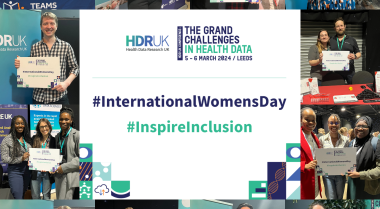“If we’re not counted, we don’t count”: Sexual orientation and gender identity data collection in healthcare services
21 June 2024 | Author: Hayley Lowther-Payne, PhD Student
In celebration of Pride month, our guest blog from post-graduate researcher Hayley Lowther-Payne explores how her own research is addressing the inequalities that exist in healthcare services for LGBTQ+ people.
The theme for LGBT History Month earlier this year was to celebrate LGBTQ+ people’s contribution to the field of health and medicine, and the value of listening to LGBTQ+ people’s lived experiences of healthcare. For my PhD research, which I am undertaking at Lancaster University, I have collaborated with a local NHS Trust to shine a light on LGBTQ+ people’s experiences of accessing mental health services during COVID-19, and in particular, what can be done to address potential inequalities. As an LGBTQ+ researcher, I have used my own lived experience to drive forward my research and raise awareness about the barriers LGBTQ+ people face when accessing healthcare services and the barriers to conducting research in this area.
Researching LGBTQ+ mental healthcare access and data collection
In my mixed methods PhD, I have been exploring service user level data from a local NHS Trust to understand how mental healthcare access for LGBTQ+ people may have changed over time, which also involves looking at both if and how sexual orientation and gender identity is routinely collected in mental health services. I have also interviewed LGBTQ+ service users about their experiences of accessing mental health services during COVID-19 and their perspectives on being asked about their sexual orientation and gender identity by services.
A lack of representation in existing datasets
In health data research, we often rely on data which is routinely collected by healthcare services to understand variations in access, experience, and outcomes. Effective planning and delivery of healthcare services requires data on patient demographics (e.g. age, gender, ethnicity) to reduce these variations and ultimately address inequalities. A lack of patient demographic data in these datasets however creates a problem in health data research, in that it limits the representation of certain population groups as participants. This particularly became apparent during the COVID-19 pandemic, where inadequate recording of ethnicity created complexities in attempting to understand disproportionate effects of the virus and efficacy of treatments.
Despite evidence that the COVID-19 pandemic caused and exacerbated existing health inequalities for some population groups, there is limited research on the impact on LGBTQ+ people (read our systematic review). Inadequate recording of sexual orientation and gender identity within healthcare services and wider research has limited the extent to which the health inequalities LGBTQ+ people face can be explored (LGBT Foundation report – “if we’re not counted, we don’t count”), and has therefore impeded action on these inequalities.
Improving data collection for inclusive research and healthcare
LGBTQ+ people often feel invisible and feel their voices are not heard when designing and delivering healthcare services. Services themselves, and the data they routinely collect, can lack inclusivity due to the heteronormative and cisnormative approach they adopt. Improving routine healthcare data collection should be a key first step in any work undertaken to address inequalities in healthcare services for LGBTQ+ people.
Addressing data gaps and key challenges to improve LGBTQ+ mental healthcare best practice
My initial research findings suggest that whilst there is representation of people from sexual minority groups (e.g. lesbian, gay, bisexual) across the NHS datasets, missing sexual orientation and gender identity is significant, making it extremely challenging to explore potential inequalities in access. Insights from my interviews indicate that LGBTQ+ service users have concerns about LGBTQ+ inclusivity within mental health services and often anticipate a poor response from healthcare professionals if they disclose their sexual orientation and/or gender identity.
A collaborative shift towards improving how we collect sexual orientation and gender identity in healthcare services is needed, along with awareness amongst researchers to apply a more inclusive lens when working with routine healthcare data. Involving LGBTQ+ service users in the design, implementation, collection, and use of routine healthcare data, including for health data research, is vital to understand what can be done to improve their experiences and address inequalities.
The findings from my research are being used to inform local actions to ensure that services are designed and delivered in a way that is inclusive for LGBTQ+ people. I currently meet with stakeholders at the NHS Trust on a regular basis to disseminate my findings on access to mental health services for LGBTQ+ people to raise awareness of the issues. I plan to continue with the NHS Trust and other stakeholders post-PhD to support the implementation of recommendations from my research findings to address improvements to sexual orientation and gender identity data collection, and LGBTQ+ service inclusivity.
If you have any questions or would like to know more about my research, please get in touch with me (h.j.lowther3@lancaster.ac.uk).




